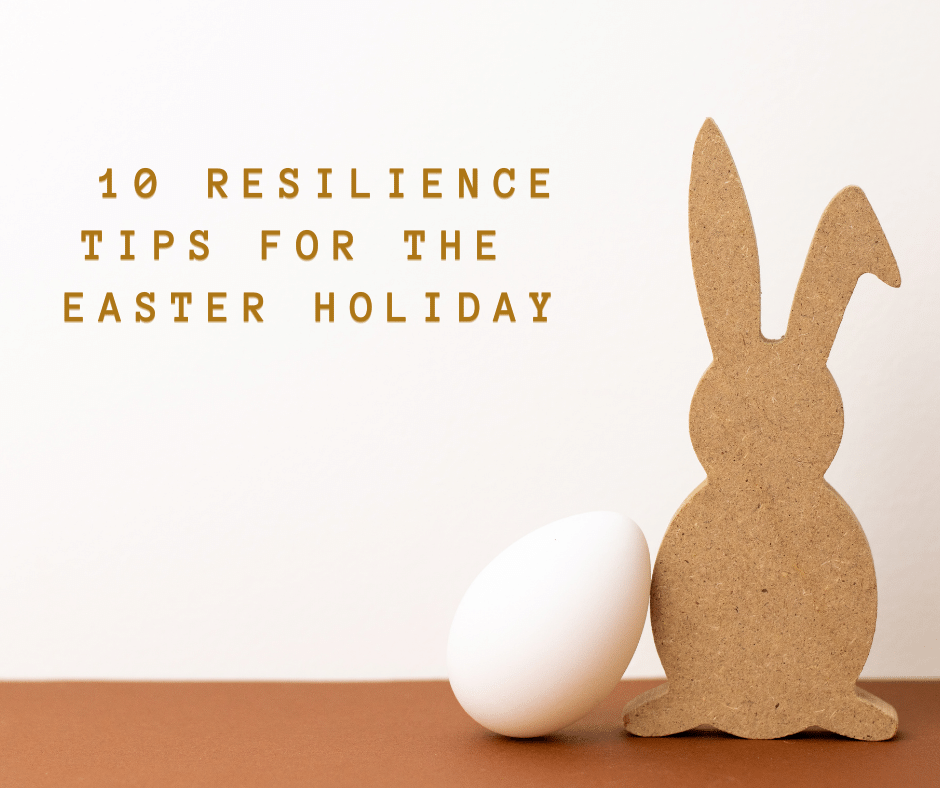School holidays can be a great way to build resilience in children. Here are our top 10 ideas for the Easter school holiday when there is a bit more time with no school or work.

1. Encourage kids to hide some of their Easter eggs for someone else to find and enjoy.
Even hiding one egg can develop your child’s gratitude muscle and they learn skills such as sharing and kindness. By giving them the responsibility of hiding their eggs they develop their independence skills.
2. Have a family Lego challenge.
This can be as long or as short as you want. Everyone in the family can think of a building challenge. If you are stuck for ideas, here are our top five:
- Make something that represents love
- Build a bridge that spans an agreed distance
- Build the largest tower with only one block at the base
- Each person creates something for 5 minutes and then passes it on to the next person to keep adding to it.
- Make a vehicle that spreads happiness.
3. Blind fold drawing
This is so much fun no-one will not suspect you are developing resilience in your children. It is the same way we teach resilience in our art classes for kids. Blind fold or cover children’s eyes and then give them some ideas to draw, like a boat or a car. So much fun when they uncover their eyes. They can then try and create something from their drawing. This is great for developing children’s ability to deal with uncertainty and be flexible.
4. Children’s Day
Have a “Children making the decisions day” which is as simple as children making all the decisions. Depending of the age and stage of your children, they can plan out the whole day (with a bit of negotiation) or decide on a few things like dinner, what mum or dad wears, which way you walk the dog. This is great for building resilience in children as it develops responsibility, decision making skills and depending how the day turns out, can teach them about consequences.
5. Teach kids to make a simple meal.
Is there a meal that you can teach your child to make for breakfast, lunch or dinner? Depending on the age of your child, they may want to research and decide on something they can make. You could spend some time making it together and then choose another time when they can be responsible for making the meal with minimal assistance from you. This is a great way to reinforce how practicing makes progress as well as developing their planning skills.
6. Money management
It is never too early to teach children about money. Why not give your children a small amount of money and get them to buy something for themselves. They get to decide what they buy. Alternatively, let them purchase what they need to make dinner in the suggestion before.
7. Let them create
Collect up some recycling in the house like cereal boxes, magazines, coffee cups, wrapping and recycled paper. Add tape, glue and let the children play. Depending on what you have in the house supplement with art supplies. Don’t give them too much direction or supplies as this activity is designed to stimulate their creative and problem solving muscles. If children are stuck for ideas give them one word ideas – animal, vehicle, building etc.
8. Get an elder relative to teach them a new card game.
Our Master Architect loves to play cards and was taught by his Dad and parents. Is there a card game or board game that someone can teach your child? It could even be a backyard game and Grandma or Grandpa don’t need to be with them, they can explain over the Interweb!!! This will not only increase their ability to master a new skill but card games are great for mathematical ability. Most games are also great for teaching children skills for life.
9. Get better at something
Each member of the family chooses to get better at something. What is one thing they want to get better at? Once chosen, everyone makes a commitment to stick at it. Choose a time each day to reflect on progress. It could be a question like “What did you do today that you are proud of? Take care that as a parent you don’t take over. Read on for ways not to take over when things get hard.
10. Do a good turn.
Helping someone is a fabulous way to develop gratitude. Maybe your child person could approach your neighbour and ask them something they could do to help.
